Tens of thousands of members of the RCN in England, Wales and Northern Ireland are holding the latest one-day stoppage after walking out last Thursday demanding an inflation-busting pay rise.
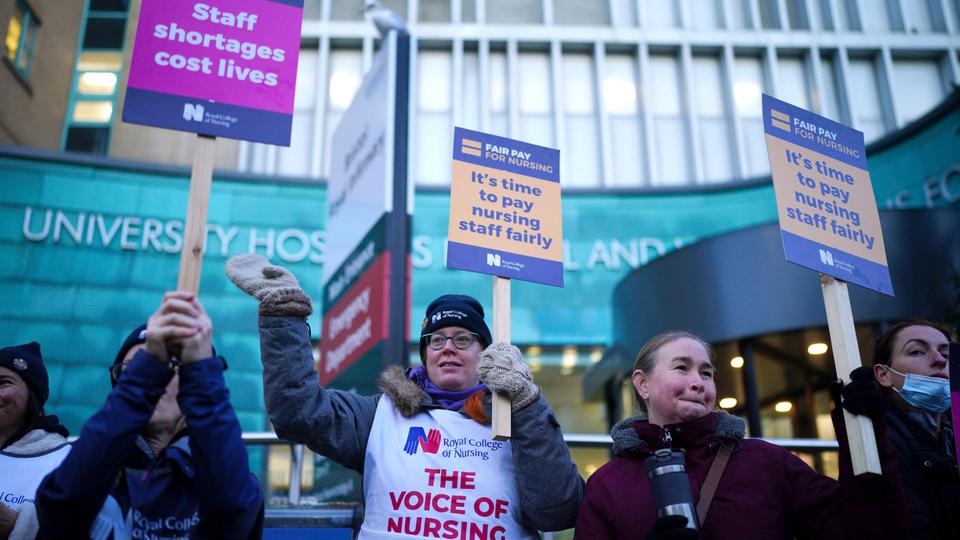
RCN chief Pat Cullen said nurses would take wider industrial action next month if the dispute was not resolved. (AP)
UK nurses have staged a second unprecedented strike amid an increasingly acrimonious fight with the government for better wages and warnings that patient safety could be jeopardised.
Up to 100,000 members of the Royal College of Nursing (RCN) in England, Wales and Northern Ireland are holding the latest one-day stoppage Tuesday after walking out last Thursday for the first time in the union's 106-year history.
They are demanding an inflation-busting pay increase to make up for years of real-terms salary cuts, but the government insists recession-hit Britain cannot afford anything above a roughly 4-5 percent rise.
"We need more money, we need more staff, we need patient safety," said Lucy Savage, 21, on a picket line outside Aintree University Hospital in the northwestern city of Liverpool.
"We're overworked and underpaid, the National Health Service (NHS) is just a shambles."
Suni George, 45, said his pay had hardly changed in his 17 years working as a nurse.
"We get a lot of tax so even when the annual income looks like it's gone up, we don't have more money," he said outside the same hospital.
Decades-high inflation
The striking nurses are just some of numerous UK public and private sector workers taking industrial action over pay and working conditions, as they grapple with a cost-of-living crisis worsened by decades-high inflation.
The UK consumer prices index is currently running at nearly 11 percent.
Ambulance workers, including paramedics and call handlers, are set to strike on Wednesday.
'Unaffordable', the RCN has criticised Prime Minister Rishi Sunak's government for refusing to discuss pay as part of stalled negotiations.
RCN chief Pat Cullen said nurses would take wider industrial action next month if the dispute was not resolved.
"If this government keeps giving our nursing staff the cold shoulder as they have to date then, it's really unfortunate, that come January, we will see more hospitals being involved and striking and that means more nursing staff involved," she said.
'Challenging times'
"The RCN's demands are unaffordable during these challenging times and would take money away from frontline services while they are still recovering from the impact of the pandemic," said Health Secretary Steve Barclay.
The government-appointed independent pay review body, comprised of economists and human resources experts, urged hiking healthcare sector pay at least £1,400 ($1,740) on top of a 3.0 percent increase last year.
On the eve of the nurses' latest strike, he insisted the government has adopted a "responsible and fair approach" to public sector pay.
"When it comes to pay, it's because these things are difficult that we have an independent process," Barclay said while on a visit to Latvia.
READ MORE: Thousands of UK nurses on day-long strike for better wages
Source: TRT World and agencies
UK nurses have staged a second unprecedented strike amid an increasingly acrimonious fight with the government for better wages and warnings that patient safety could be jeopardised.
Up to 100,000 members of the Royal College of Nursing (RCN) in England, Wales and Northern Ireland are holding the latest one-day stoppage Tuesday after walking out last Thursday for the first time in the union's 106-year history.
They are demanding an inflation-busting pay increase to make up for years of real-terms salary cuts, but the government insists recession-hit Britain cannot afford anything above a roughly 4-5 percent rise.
"We need more money, we need more staff, we need patient safety," said Lucy Savage, 21, on a picket line outside Aintree University Hospital in the northwestern city of Liverpool.
"We're overworked and underpaid, the National Health Service (NHS) is just a shambles."
Suni George, 45, said his pay had hardly changed in his 17 years working as a nurse.
"We get a lot of tax so even when the annual income looks like it's gone up, we don't have more money," he said outside the same hospital.
Decades-high inflation
The striking nurses are just some of numerous UK public and private sector workers taking industrial action over pay and working conditions, as they grapple with a cost-of-living crisis worsened by decades-high inflation.
The UK consumer prices index is currently running at nearly 11 percent.
Ambulance workers, including paramedics and call handlers, are set to strike on Wednesday.
'Unaffordable', the RCN has criticised Prime Minister Rishi Sunak's government for refusing to discuss pay as part of stalled negotiations.
RCN chief Pat Cullen said nurses would take wider industrial action next month if the dispute was not resolved.
"If this government keeps giving our nursing staff the cold shoulder as they have to date then, it's really unfortunate, that come January, we will see more hospitals being involved and striking and that means more nursing staff involved," she said.
'Challenging times'
"The RCN's demands are unaffordable during these challenging times and would take money away from frontline services while they are still recovering from the impact of the pandemic," said Health Secretary Steve Barclay.
The government-appointed independent pay review body, comprised of economists and human resources experts, urged hiking healthcare sector pay at least £1,400 ($1,740) on top of a 3.0 percent increase last year.
On the eve of the nurses' latest strike, he insisted the government has adopted a "responsible and fair approach" to public sector pay.
"When it comes to pay, it's because these things are difficult that we have an independent process," Barclay said while on a visit to Latvia.
READ MORE: Thousands of UK nurses on day-long strike for better wages
Source: TRT World and agencies
Nurses to begin second day of strikes as union leader tells Rishi Sunak to 'listen' or risk further industrial action
Ahead of the second day of nursing strikes, RCN general secretary and chief executive, Pat Cullen warned Rishi Sunak to "listen to people around him" or face continued strikes next year.
Sophie Morris
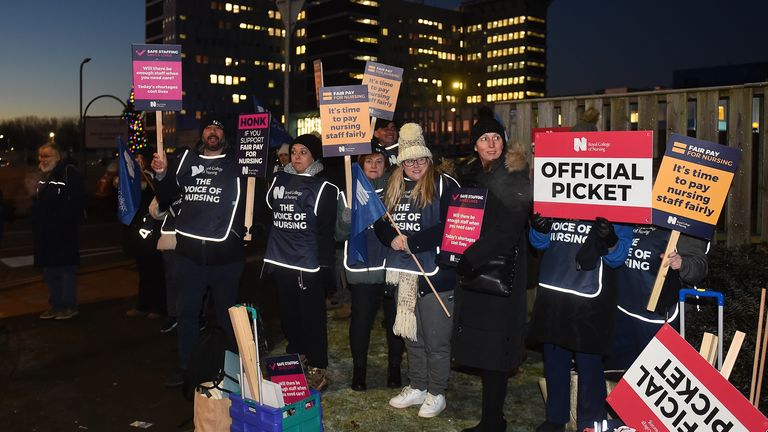
Nurses striking with reluctance
"The public is increasingly with their local nursing staff and this government desperately needs to get on the right side of them. It is unprecedented for my members to strike.
"Let's get this wrapped up by Christmas. I will negotiate with him at any point to stop nursing staff and patients going into the new year facing such uncertainty.
"But if this government isn't prepared to do the right thing, we'll have no choice but to continue in January and that will be deeply regrettable."
Read More: How strike will impact A&E and other NHS services - and which hospitals are affected
When the RCN submitted the 5% figure to the independent pay review body in March, inflation was running at 7.5%.
But inflation has since soared, with RPI standing at 14.2% in September.
The health secretary reiterated that the RCN's demands are "unaffordable".
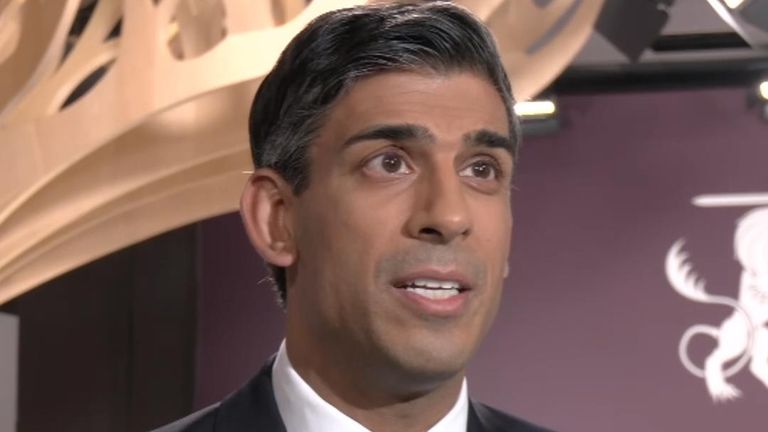
PM urges nurses to rethink strikes
"I hugely value the work of our NHS staff and it is disappointing some union members are going ahead with further strike action when we know the impact this has on patients," he said.
"My number one priority remains keeping patients as safe as possible and I've been working closely with the NHS and across government to protect safe staffing levels.
"The NHS remains open, patients should continue to come forward for emergency and urgent medical care. They should also continue to turn up to appointments unless they have been contacted by the NHS.
"The RCN's demands are unaffordable during these challenging times and would take money away from frontline services while they are still recovering from the impact of the pandemic.
"I'm open to engaging with the unions on how to make the NHS a better place to work."
Meanwhile, Mr Barclay is due to meet with members of Unite, Unison and GMB unions this afternoon to get assurances from union officials that Category 2 incidents - such as strokes or cases of serious chest pain - will be attended to during industrial action.
Sources say the health secretary will not discuss increasing wages during the fresh talks.
Ambulance workers are due to strike on 21 and 28 December.
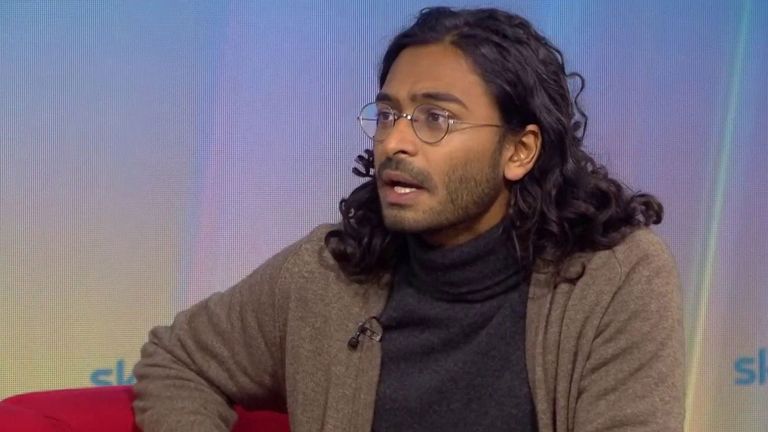
Nurses pay has 'fallen off a cliff'
The UK is facing a wave of strikes this winter, with at least one walkout a day ahead of Christmas, as staff from different industries seek better pay.
Read more: Who are striking on what day?
From transport to the NHS, education to delivery drivers, tens of thousands of workers are taking action as recession grips the UK and the cost of living rises.
Mr Sunak will be probed on the continued strike chaos when he makes his debut appearance at the Liaison Committee on the last day of the parliamentary term this afternoon.
He will face questions from chairs of the parliamentary committees on global issues, the UK's place in the world and economic issues - including the cost of living.
Ahead of the second day of nursing strikes, RCN general secretary and chief executive, Pat Cullen warned Rishi Sunak to "listen to people around him" or face continued strikes next year.
Sophie Morris
SKY NEWS
Political reporter @itssophiemorris
Tuesday 20 December 2022
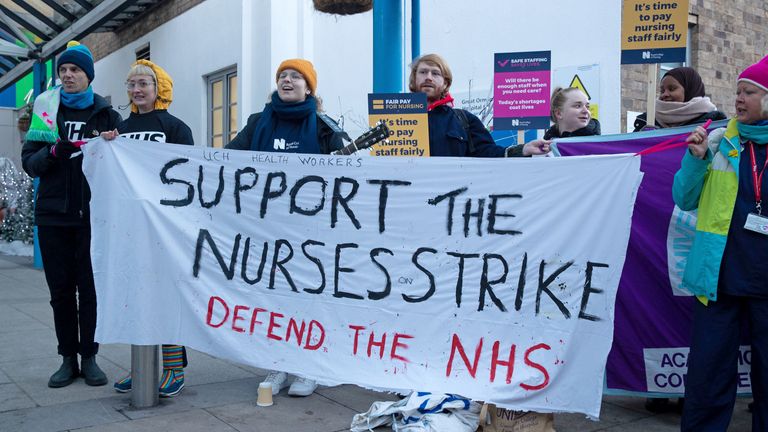
Political reporter @itssophiemorris
Tuesday 20 December 2022

Members of the Royal College of Nursing (RCN) on the picket line in London last Thursday
Members of the Royal College of Nursing (RCN) will stage their second walkout across England, Wales and Northern Ireland today - as Health Secretary Steve Barclay is set to hold crisis talks with ambulance worker unions on emergency strike cover.
Tens of thousands of nurses took part in the first day of strike action last Thursday in their first mass walkout in a century.
The industrial action, a bid to secure above-inflation pay rises, will proceed again today after no breakthrough was found between the government and the Royal College of Nursing (RCN).
Picket lines are expected to be in place at dozens of hospitals and thousands of NHS appointments and operations are set to be cancelled, with the health service running a bank holiday-style service in many areas.
The RCN has said it will still staff chemotherapy, emergency cancer services, dialysis, critical care units, neonatal and paediatric intensive care.
When it comes to adult A&E and urgent care, nurses will work Christmas Day-style rotas.
The government has accepted recommendations made by the NHS Pay Review Body (PRB) to give nurses below inflation pay rises of around 4%.
The RCN has been calling for a pay rise of 19.2% - 5% above inflation - though it has indicated it would accept a lower offer.
Health Minister Will Quince told Sky News his and the health secretary's doors "are open when it comes to discussing issues around patient safety and working conditions for staff".
"What we are not willing to negotiate is reopening the pay for this year, which is part of the independent pay review body recommendations, which the government accepted in full," he added.
Mr Quince said we are three-quarters of the way through the year and the pay review bodies are now looking at pay recommendations for next year, from April.
Ahead of the second day of nursing strikes, RCN general secretary and chief executive, Pat Cullen warned Rishi Sunak to "listen to people around him" or face continued strikes next year.
"The prime minister should ask himself what is motivating nursing staff to stand outside their hospitals for a second day so close to Christmas," she said.
"They are prepared to sacrifice a day's pay to have their concerns heard. Their determination stems as much from worries over patient safety and the future of the NHS than personal hardship.
"Rishi Sunak is under growing pressure in Westminster following last Thursday's strike and he should listen to people around him.
Read more: Health Secretary Steve Barclay challenged by mother during hospital visit
Members of the Royal College of Nursing (RCN) will stage their second walkout across England, Wales and Northern Ireland today - as Health Secretary Steve Barclay is set to hold crisis talks with ambulance worker unions on emergency strike cover.
Tens of thousands of nurses took part in the first day of strike action last Thursday in their first mass walkout in a century.
The industrial action, a bid to secure above-inflation pay rises, will proceed again today after no breakthrough was found between the government and the Royal College of Nursing (RCN).
Picket lines are expected to be in place at dozens of hospitals and thousands of NHS appointments and operations are set to be cancelled, with the health service running a bank holiday-style service in many areas.
The RCN has said it will still staff chemotherapy, emergency cancer services, dialysis, critical care units, neonatal and paediatric intensive care.
When it comes to adult A&E and urgent care, nurses will work Christmas Day-style rotas.
The government has accepted recommendations made by the NHS Pay Review Body (PRB) to give nurses below inflation pay rises of around 4%.
The RCN has been calling for a pay rise of 19.2% - 5% above inflation - though it has indicated it would accept a lower offer.
Health Minister Will Quince told Sky News his and the health secretary's doors "are open when it comes to discussing issues around patient safety and working conditions for staff".
"What we are not willing to negotiate is reopening the pay for this year, which is part of the independent pay review body recommendations, which the government accepted in full," he added.
Mr Quince said we are three-quarters of the way through the year and the pay review bodies are now looking at pay recommendations for next year, from April.
Ahead of the second day of nursing strikes, RCN general secretary and chief executive, Pat Cullen warned Rishi Sunak to "listen to people around him" or face continued strikes next year.
"The prime minister should ask himself what is motivating nursing staff to stand outside their hospitals for a second day so close to Christmas," she said.
"They are prepared to sacrifice a day's pay to have their concerns heard. Their determination stems as much from worries over patient safety and the future of the NHS than personal hardship.
"Rishi Sunak is under growing pressure in Westminster following last Thursday's strike and he should listen to people around him.
Read more: Health Secretary Steve Barclay challenged by mother during hospital visit

Nurses striking with reluctance
"The public is increasingly with their local nursing staff and this government desperately needs to get on the right side of them. It is unprecedented for my members to strike.
"Let's get this wrapped up by Christmas. I will negotiate with him at any point to stop nursing staff and patients going into the new year facing such uncertainty.
"But if this government isn't prepared to do the right thing, we'll have no choice but to continue in January and that will be deeply regrettable."
Read More: How strike will impact A&E and other NHS services - and which hospitals are affected
When the RCN submitted the 5% figure to the independent pay review body in March, inflation was running at 7.5%.
But inflation has since soared, with RPI standing at 14.2% in September.
The health secretary reiterated that the RCN's demands are "unaffordable".

PM urges nurses to rethink strikes
"I hugely value the work of our NHS staff and it is disappointing some union members are going ahead with further strike action when we know the impact this has on patients," he said.
"My number one priority remains keeping patients as safe as possible and I've been working closely with the NHS and across government to protect safe staffing levels.
"The NHS remains open, patients should continue to come forward for emergency and urgent medical care. They should also continue to turn up to appointments unless they have been contacted by the NHS.
"The RCN's demands are unaffordable during these challenging times and would take money away from frontline services while they are still recovering from the impact of the pandemic.
"I'm open to engaging with the unions on how to make the NHS a better place to work."
Meanwhile, Mr Barclay is due to meet with members of Unite, Unison and GMB unions this afternoon to get assurances from union officials that Category 2 incidents - such as strokes or cases of serious chest pain - will be attended to during industrial action.
Sources say the health secretary will not discuss increasing wages during the fresh talks.
Ambulance workers are due to strike on 21 and 28 December.

Nurses pay has 'fallen off a cliff'
The UK is facing a wave of strikes this winter, with at least one walkout a day ahead of Christmas, as staff from different industries seek better pay.
Read more: Who are striking on what day?
From transport to the NHS, education to delivery drivers, tens of thousands of workers are taking action as recession grips the UK and the cost of living rises.
Mr Sunak will be probed on the continued strike chaos when he makes his debut appearance at the Liaison Committee on the last day of the parliamentary term this afternoon.
He will face questions from chairs of the parliamentary committees on global issues, the UK's place in the world and economic issues - including the cost of living.
Nurses to strike as ambulance crews plan walkouts
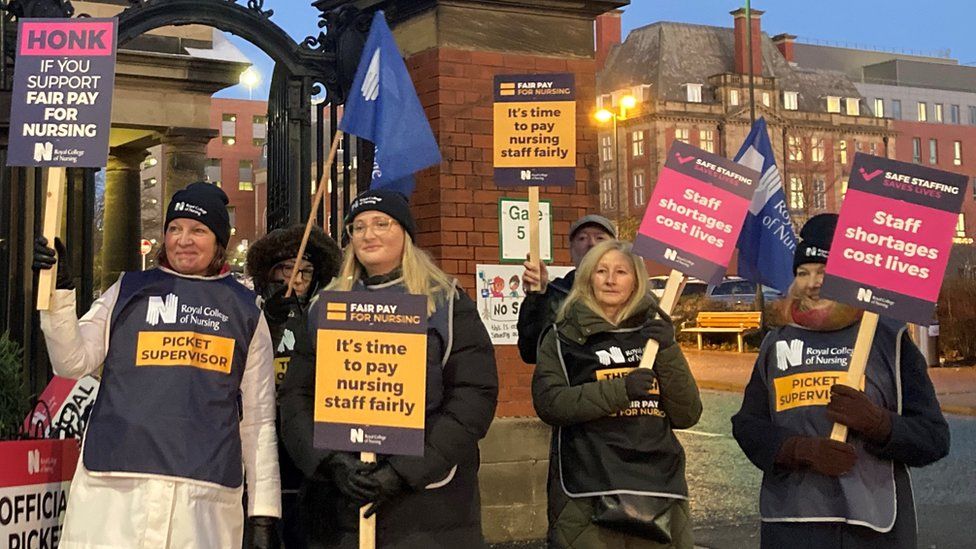
Nurses in England, Wales and Northern Ireland first walked out last week in the largest action of its kind
By Michelle Roberts
Digital health editor
About 10,000 NHS nurses in England, Wales and Northern Ireland are to strike for the second time in less than a week in protest over their pay.
Wednesday will see ambulance staff in England and Wales walk out too, unless a meeting later with the health secretary can avert it.
Steve Barclay has invited three unions representing paramedics to talks.
It follows warnings of extensive disruption to services at a very challenging time of year for the NHS.
The joint letter was sent out by health chiefs to NHS trusts and integrated care boards in England, urging hospitals to free-up beds by safely discharging patients ahead of industrial action by ambulance crews.
Measures should also be put in place to make sure ambulance patient handovers are kept to no more than 15 minutes, it advises.
The health secretary will meet with ambulance unions later today, but will be discussing staffing measures rather than the issue of pay.
There is no sign that ministers will adjust their stance over pay, the BBC's Nick Eardley said. The prime minister has told the Daily Mail he will keep making same argument that the current offer is fair and reasonable.
"I really urge the unions to consider the impact these strikes are having on people's lives and their health and to consider whether that's really appropriate," he said.
Nurses staged their biggest ever strike in the history of the NHS last week.
Nearly 10,000 staff were absent on Thursday and 16,000 appointments and surgeries had to be rescheduled in England alone.
Tuesday's 12-hour walkout, which starts at 08:00 GMT, could cause similar disruption, although services such as urgent cancer care, will continue.
The strike involves nurses in about a quarter of hospitals and community teams in England, all health boards in Northern Ireland and all but one health board in Wales. Nurses are not striking in Scotland.
Protected services include chemotherapy, emergency cancer services, dialysis, critical care units, neonatal and paediatric intensive care, along with some areas of mental health and learning disability and autism services.
What will nurses' strike mean for patients?
Why are the strikes happening?
The walkout is mostly about pay.
In England and Wales, most NHS staff have already received a pay rise of roughly £1,400 this year - worth about 4%, on average, for nurses.
The Royal College of Nursing (RCN) union wants a 19% pay rise- 5% above the RPI inflation rate which currently stands at 14% - saying its members have received years of below-inflation pay increases.
Prime Minister Rishi Sunak has said the pay offer to nurses is appropriate and fair, despite pressure from health leaders and some former Conservative ministers to rethink.
But RCN general secretary Pat Cullen said he should ask himself why nurses are about to strike for the second time in their history.
Calling for talks with Mr Sunak, Ms Cullen said: "Let's get this wrapped up by Christmas.
"I will negotiate with him at any point to stop nursing staff and patients going into the New Year facing such uncertainty."
If there was no deal there would be more strikes next year, with more staff and further hospitals included, she warned on Radio 4's Today.
Ms Cullen said she was "truly sorry" for every patient whose care had been disrupted because of the nursing strikes.
However, she added that any disruption to a health service "that's as fragile as ours" is something that this government "really needs to take a long, hard look at".
The government maintains the nurses' demands are unaffordable and the recommendation of an independent pay review body in setting wages have been followed.
Health Secretary Steve Barclay said it was "disappointing" union members were striking despite the impact on patients.
"The RCN's demands are unaffordable during these challenging times and would take money away from frontline services while they are still recovering from the impact of the pandemic," he said.
He added that he was "open to engaging with the unions on how to make the NHS a better place to work".
Nurses are not going to "turn off care" despite union members facing "a desperate situation" and "living in poverty", the RCN's Estephanie Dunn told BBC Breakfast.
Stephen Barclay needs to meet with unions and negotiate - with pay being the "burning issue" for members, she said.
The RCN has threatened to escalate strike action if ministers do not join talks within 48 hours of Tuesday's walkout.
The action by nurses will be followed on Wednesday by a strike by ambulance staff, when Unison, GMB and Unite members take action. GMB union members will go on strike again on 28 December.
Around 1,200 members of the military are being drafted in to cover the striking ambulance workers in a move unions call a "desperate measure". It is expected they will be handling less serious calls.
All of the most life-threatening calls, like cardiac arrest, will be responded too, but people who suffer trips, falls and other non-life threatening injuries may not be sent an ambulance.
North East Ambulance Service said it would not be able to respond to all calls of a serious nature and some patients would have to make their own way to hospital.
Stephen Segasby, from the service, said: "Ambulances will still be able to respond during the strike, but this will only be where there is an immediate risk to life.
"This means that less serious calls will not receive a response and some patients might be asked to make their own way to hospital, where it is safe for them to do so."
London Ambulance Service also warned that patients with conditions that were not life-threatening were unlikely to get an ambulance on strike days.
Nurses' leader Pat Cullen: Profile
The strikes in the health service are part of widespread industrial action across a number of public sectors.
The main union representing Border Force staff is set to walk out for eight days between 23 and 31 December.
Postal strikes will take place on 23 and 24 December - some of the busiest days for pre-Christmas deliveries. The RMT rail workers' union is also set to stage strike action between Christmas Eve and 27 December.
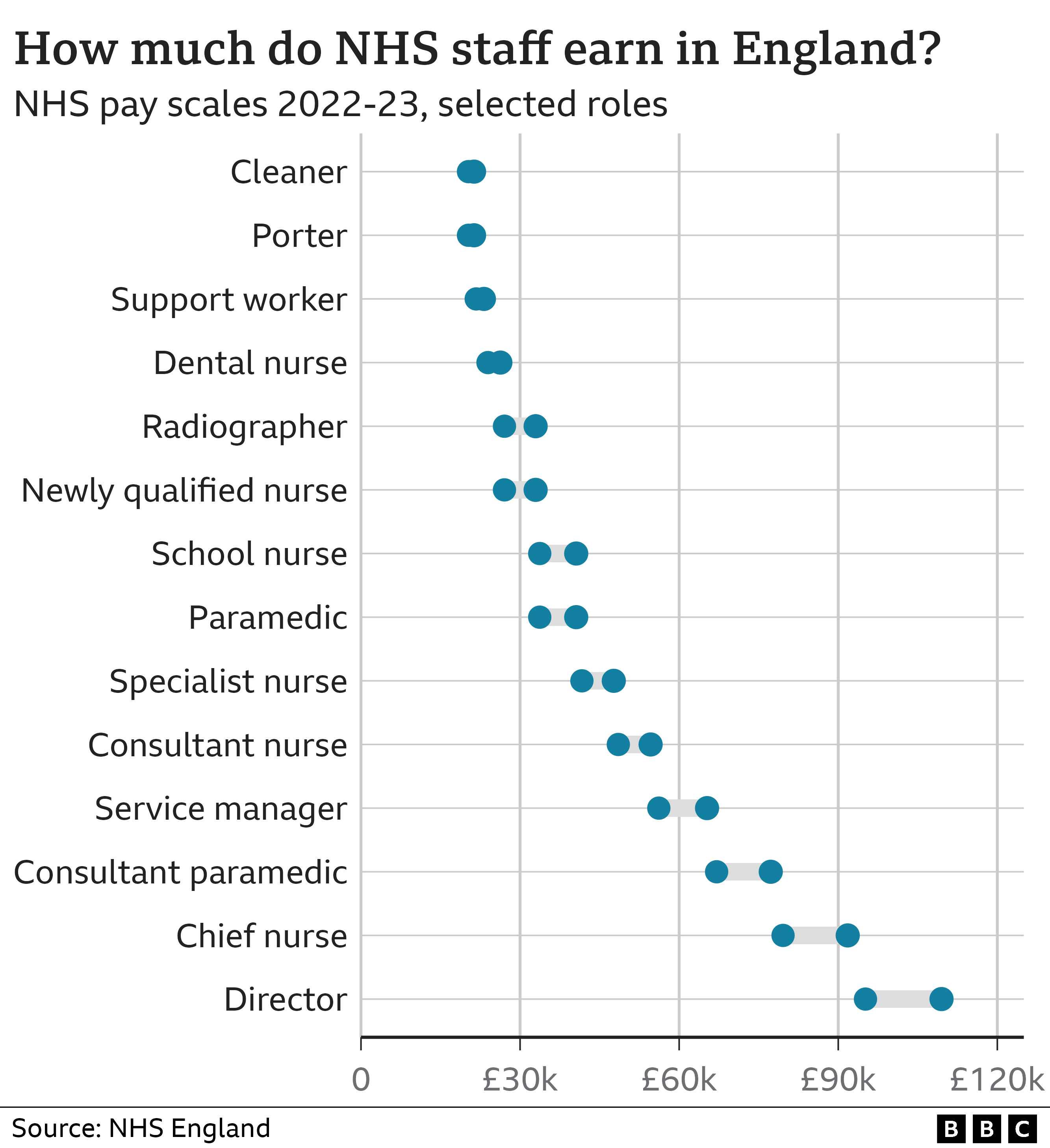

How will patients be affected?
People who are seriously ill or injured, and whose life is at risk, should call 999 as usual, or call 111 for non-urgent care
Other services, such as some cancer treatments, mental health services or urgent testing, may be partially staffed
Routine care is likely to be badly affected, including planned operations such as knee and hip replacements, community nursing services and health visits
Official advice is that those with an appointment which hasn't already been rearranged should turn up at their allotted time
GPs, community pharmacies and dentists will not be affected

Watch Make Sense of Strikes on iPlayer and find out more about why people are striking and whether industrial action works.

Nurses in England, Wales and Northern Ireland first walked out last week in the largest action of its kind
By Michelle Roberts
Digital health editor
About 10,000 NHS nurses in England, Wales and Northern Ireland are to strike for the second time in less than a week in protest over their pay.
Wednesday will see ambulance staff in England and Wales walk out too, unless a meeting later with the health secretary can avert it.
Steve Barclay has invited three unions representing paramedics to talks.
It follows warnings of extensive disruption to services at a very challenging time of year for the NHS.
The joint letter was sent out by health chiefs to NHS trusts and integrated care boards in England, urging hospitals to free-up beds by safely discharging patients ahead of industrial action by ambulance crews.
Measures should also be put in place to make sure ambulance patient handovers are kept to no more than 15 minutes, it advises.
The health secretary will meet with ambulance unions later today, but will be discussing staffing measures rather than the issue of pay.
There is no sign that ministers will adjust their stance over pay, the BBC's Nick Eardley said. The prime minister has told the Daily Mail he will keep making same argument that the current offer is fair and reasonable.
"I really urge the unions to consider the impact these strikes are having on people's lives and their health and to consider whether that's really appropriate," he said.
Nurses staged their biggest ever strike in the history of the NHS last week.
Nearly 10,000 staff were absent on Thursday and 16,000 appointments and surgeries had to be rescheduled in England alone.
Tuesday's 12-hour walkout, which starts at 08:00 GMT, could cause similar disruption, although services such as urgent cancer care, will continue.
The strike involves nurses in about a quarter of hospitals and community teams in England, all health boards in Northern Ireland and all but one health board in Wales. Nurses are not striking in Scotland.
Protected services include chemotherapy, emergency cancer services, dialysis, critical care units, neonatal and paediatric intensive care, along with some areas of mental health and learning disability and autism services.
What will nurses' strike mean for patients?
Why are the strikes happening?
The walkout is mostly about pay.
In England and Wales, most NHS staff have already received a pay rise of roughly £1,400 this year - worth about 4%, on average, for nurses.
The Royal College of Nursing (RCN) union wants a 19% pay rise- 5% above the RPI inflation rate which currently stands at 14% - saying its members have received years of below-inflation pay increases.
Prime Minister Rishi Sunak has said the pay offer to nurses is appropriate and fair, despite pressure from health leaders and some former Conservative ministers to rethink.
But RCN general secretary Pat Cullen said he should ask himself why nurses are about to strike for the second time in their history.
Calling for talks with Mr Sunak, Ms Cullen said: "Let's get this wrapped up by Christmas.
"I will negotiate with him at any point to stop nursing staff and patients going into the New Year facing such uncertainty."
If there was no deal there would be more strikes next year, with more staff and further hospitals included, she warned on Radio 4's Today.
Ms Cullen said she was "truly sorry" for every patient whose care had been disrupted because of the nursing strikes.
However, she added that any disruption to a health service "that's as fragile as ours" is something that this government "really needs to take a long, hard look at".
The government maintains the nurses' demands are unaffordable and the recommendation of an independent pay review body in setting wages have been followed.
Health Secretary Steve Barclay said it was "disappointing" union members were striking despite the impact on patients.
"The RCN's demands are unaffordable during these challenging times and would take money away from frontline services while they are still recovering from the impact of the pandemic," he said.
He added that he was "open to engaging with the unions on how to make the NHS a better place to work".
Nurses are not going to "turn off care" despite union members facing "a desperate situation" and "living in poverty", the RCN's Estephanie Dunn told BBC Breakfast.
Stephen Barclay needs to meet with unions and negotiate - with pay being the "burning issue" for members, she said.
The RCN has threatened to escalate strike action if ministers do not join talks within 48 hours of Tuesday's walkout.
The action by nurses will be followed on Wednesday by a strike by ambulance staff, when Unison, GMB and Unite members take action. GMB union members will go on strike again on 28 December.
Around 1,200 members of the military are being drafted in to cover the striking ambulance workers in a move unions call a "desperate measure". It is expected they will be handling less serious calls.
All of the most life-threatening calls, like cardiac arrest, will be responded too, but people who suffer trips, falls and other non-life threatening injuries may not be sent an ambulance.
North East Ambulance Service said it would not be able to respond to all calls of a serious nature and some patients would have to make their own way to hospital.
Stephen Segasby, from the service, said: "Ambulances will still be able to respond during the strike, but this will only be where there is an immediate risk to life.
"This means that less serious calls will not receive a response and some patients might be asked to make their own way to hospital, where it is safe for them to do so."
London Ambulance Service also warned that patients with conditions that were not life-threatening were unlikely to get an ambulance on strike days.
Nurses' leader Pat Cullen: Profile
The strikes in the health service are part of widespread industrial action across a number of public sectors.
The main union representing Border Force staff is set to walk out for eight days between 23 and 31 December.
Postal strikes will take place on 23 and 24 December - some of the busiest days for pre-Christmas deliveries. The RMT rail workers' union is also set to stage strike action between Christmas Eve and 27 December.


How will patients be affected?
People who are seriously ill or injured, and whose life is at risk, should call 999 as usual, or call 111 for non-urgent care
Other services, such as some cancer treatments, mental health services or urgent testing, may be partially staffed
Routine care is likely to be badly affected, including planned operations such as knee and hip replacements, community nursing services and health visits
Official advice is that those with an appointment which hasn't already been rearranged should turn up at their allotted time
GPs, community pharmacies and dentists will not be affected
Watch Make Sense of Strikes on iPlayer and find out more about why people are striking and whether industrial action works.
No comments:
Post a Comment